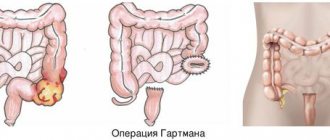Intestinal dysbiosis is a condition that can be accompanied by a whole range of painful symptoms. It involves a change in the qualitative and quantitative composition of the microflora in the large and small intestines, and the proliferation of opportunistic microorganisms.
There are several mechanisms for the development of intestinal manifestations of dysbiosis, and one of them causes intestinal motor disorders. Despite the fact that an imbalance of microflora is most often manifested by diarrhea, stool retention in this case is not uncommon. Constipation can aggravate dysbiosis, so it is important to start treatment in a timely manner.
Causes of constipation due to dysbacteriosis
Dysbacteriosis is not an independent disease, so it is always necessary to establish the root cause. The following factors can lead to the development of the condition:
- Taking certain medications: dysbiosis develops against the background of antibacterial therapy, and the duration of the course is also important. So, Kostyukevich in his work about (Kostyukevich O.I., 2007, p. 2176). The risk of development is increased by corticosteroids, hormonal contraceptives, cytostatics, and laxatives.
- Unbalanced nutrition for a long time, when there is a shortage or excess of any substances, consumption of refined foods and products with dyes and preservatives.
- Chronic diseases of the digestive system: primarily diseases accompanied by malabsorption syndrome, impaired production of gastric juice and digestive enzymes, etc.
- Acute intestinal infections: can cause post-infectious dysbiosis.
- Immune function disorders, systemic connective tissue diseases, blood diseases and other pathologies.
Therefore, treatment of constipation due to dysbacteriosis is always complex. Delayed defecation can be associated both with the underlying disease and directly with its consequence - an imbalance in the intestinal microflora. An imbalance of microflora causes motor disorders, provoking the so-called hypomotor dyskinesia. It may be accompanied by painless constipation or stool retention with characteristic symptoms - pain, vomiting, nausea, bloating. With spastic dyskinesia, constipation develops with bean-shaped feces and paroxysmal abdominal pain.
There is another mechanism for the development of intestinal disorders during dysbiosis. Doctor Yakovenko believes that “the presence of opportunistic microflora in the small and large intestine can lead to the development of inflammatory processes” (Yakovenko E.P., 2004, p. 5).
Diagnostics
The primary link in diagnosing intestinal dysbiosis is the assessment of patient complaints. To confirm the clinical diagnosis, a laboratory test of stool cultures for bacterial flora and an analysis for dysbacteriosis are performed. The material for laboratory testing for intestinal dysbiosis is a scraping of the colon mucosa or aspiration of the organ contents. Indirect signs of this condition are detected when performing a coprogram. how to treat intestinal dysbiosis .
Symptoms and consequences
One of the characteristic symptoms of dysbiosis is alternating diarrhea and constipation. This is due to the increased production of organic acids, which lead to fluid retention in the intestinal lumen. In addition, premature breakdown of bile acids leads to disruption of the intestinal acidity level, damage to the mucous membranes and other consequences. At the same time, intestinal motility disorders are also common.
Most people suffering from dysbacteriosis also note other symptoms: pain in different parts of the abdomen, bloating, a feeling of heaviness in the abdomen, nausea, mucus in the stool, belching, bitterness in the mouth, and bad breath.
Even in the absence of constipation, unpleasant complications of dysbiosis can develop. A delay in defecation significantly aggravates the health condition and leads to accelerated development of the consequences of the disease. Constipation leads to intoxication of the body, hence the following symptoms:
- increased fatigue;
- sweating;
- dizziness;
- prolonged low-grade fever;
- exacerbation of chronic diseases;
- development of allergic reactions, etc.
If dysbiosis is not treated, serious complications may develop, such as hypovitaminosis, iron deficiency and B12 deficiency anemia, food allergies, dermatological diseases, decreased resistance to infections, etc. Constipation can cause anal fissures and the appearance of hemorrhoids, it increases the risk of inflammatory proctological diseases like proctosigmoiditis, paraproctitis, etc. In the long term, frequent constipation becomes a risk factor for the development of atherosclerosis, heart attacks and strokes, colorectal cancer, diverticulosis and other serious diseases.
Get rid of intestinal problems
The natural British drug is not addictive and works immediately
Find Fitomucil with benefits
Other examination methods
There is another, less common, but more accurate and faster method of microbiological examination - chromatography-mass spectrometry of microbial markers (CMS, or as it is also called MSMM). It was developed by Doctor of Biological Sciences G.A. Osipov and is used in some laboratories.
This method allows you to study the microbiological composition of various biological materials - blood, urine, saliva, vaginal discharge, etc. The analysis is carried out within 3 hours and allows you to determine the presence of 50 microorganisms in the test material without inoculation, using the so-called signal molecules (microbial markers).
Features of treatment
Treatment of constipation due to intestinal dysbiosis is always aimed at the underlying disease and restoration of normal microflora. And if the medicinal prescriptions for each patient are unique, then the principle of creating normal conditions for the growth of microflora is the same for everyone. The specialist will develop a diet taking into account the type of dyspepsia, intestinal motor disorders, as well as the specifics of the underlying disease.
For example, in case of putrefactive processes, the doctor will recommend limiting protein intake to 50 g. If the history of constipation is predominant, a diet rich in dietary fiber is mandatory. WHO recommends consuming at least 35 g of dietary fiber per day.
Antibiotics may be prescribed to suppress excess opportunistic flora. Typically, such conditions are not accompanied by constipation, so antibacterial agents and intestinal antiseptics are not prescribed for delayed bowel movements.
Dysbiosis with minimal clinical manifestations can often be corrected only with the help of prebiotics and probiotics. The first are drugs that stimulate the growth of one's own microflora. They can be prescribed for prevention, for example during antibacterial therapy, or directly to correct the condition.
Probiotics are live microorganisms that suppress the growth of pathogenic and opportunistic microflora. Probiotics contain anaerobic and aerobic flora or a combination of both. Thus, bifidobacteria are included in the group of anaerobic flora, and lactobacilli are aerobic.
Experts say that damage to the small intestine requires the use of aerobic drugs, while anaerobic microorganisms are necessary for dysbiosis of the large intestine. Combined products allow you to have a comprehensive effect on the intestines, which is especially important in cases where it is not possible to find out which part of the intestines has suffered more from dysbiosis. In addition, isolated damage to only one department is quite rare, which is why preference is given to combined agents.
Treatment of constipation due to dysbacteriosis with the help of probiotics allows you to solve several problems at once:
- suppress putrefactive, opportunistic flora;
- activate immune defense;
- reduce intoxication;
- improve intestinal motility;
- increase the production of vitamins in the intestines.
Typically, recovery takes several weeks, but improvement is often observed soon after starting therapy.
How to support natural microflora
Drops for oral administration – Acipol® Malysh, drops can help maintain the natural intestinal microflora. They belong to biologically active additives, which include the required amount of colony-forming organisms - lactobacilli, bifidobacteria.
The method of dispensing the product is very simple - there is a dispenser attachment. There is no need to dilute the substance; it is available in suspension. According to the instructions for use, Acipol® Baby, drops are given to the child once a day, 5 drops, it can be added to the mixture with water.
Combating constipation due to dysbacteriosis
To instantly eliminate constipation associated with intestinal dysbiosis, it is not always enough to take probiotics and prebiotics. Firstly, improvements become noticeable only a few days, and more often, weeks after the start of correction. Secondly, a prolonged delay in emptying requires immediate assistance to avoid increased symptoms of intoxication and worsening of the condition. Therefore, it is important to follow the doctor’s instructions and strictly follow the recommended diet, enrich your diet with dietary fiber, and drink enough water.
If such measures are ineffective and rapid bowel movements are necessary, you can resort to taking special medications.
The choice of laxative for dysbacteriosis should be entrusted to a doctor. This is due to the fact that some drugs for liquefying stool are themselves a risk factor for the development of dysbiosis. Abusing them or exceeding recommended dosages can worsen the condition. If dysbiosis is associated specifically with uncontrolled use of laxatives, it is important to consult a specialist.
Among the means to combat constipation due to dysbacteriosis, there are drugs that are not addictive. Herbal remedies based on natural dietary fiber can delicately solve the problem and improve intestinal motility. One of these laxatives is the British drug Fitomucil Norm. It contains the shell of plantain seeds and the pulp of plum fruits.
The soluble fibers of the drug absorb water, turn into a mucous gel and help soften and remove stool. Insoluble fiber stimulates intestinal motility, accelerating the excretion of feces. The product acts gently and predictably and helps normalize stool. In addition, psyllium creates favorable conditions for the proliferation of beneficial microflora in the intestines and is a natural sorbent, helping to reduce the symptoms of intoxication. Plum pectin enhances the prebiotic effect and stimulates the growth of beneficial bacteria.
Let's talk about microbiota
The human body is home to a great variety of microorganisms: viruses, bacteria, fungi, protozoa. Each of them has their own role. They have been our integral neighbors for many centuries. Their number can exceed the number of cells in the human body itself. Microorganisms are everywhere: on the skin, in the mouth, on mucous membranes, in breast milk and even in the placenta. There are practically no sterile zones in our body. And each has its own profile of inhabitants. Most species are found on the skin and in the intestines.
However, in terms of microbial mass, the colon is ahead of everyone. It alone can contain up to one and a half to two kilograms of microbial bodies. They are actively involved in the process of digesting food and train the human immune system. It has been proven that the more diverse the microbiota, the more adapted the body is to various changes.
With the development of civilization and medicine, the number of representatives of the microworld has decreased significantly. The use of antibiotics, antiseptics, pesticides and other inventions of mankind has had a detrimental effect on nature and our health. We are losing the diversity of microorganisms, resulting in an increase in non-infectious chronic pathologies.
It is important!
In children suffering from allergic diseases, a small number of representatives of the microcosm and their meager diversity were noted. In children born surgically, colonization of the intestines by beneficial bacteria is slowed and delayed. These are the realities of our time.
Provoking factors for the development of dysbiosis
The most common factor in imbalance is previous infections, and not only intestinal ones.
Otherwise, we ourselves very successfully destroy it or initially set the wrong vector for the formation of relationships with microorganisms through our actions: by excessively actively using antibiotics
- early transfer to artificial feeding
- often resorting to surgical delivery.
- Stress, increased physical and psycho-emotional stress, smoking, alcohol abuse or illegal substances are practically not encountered in early childhood.








